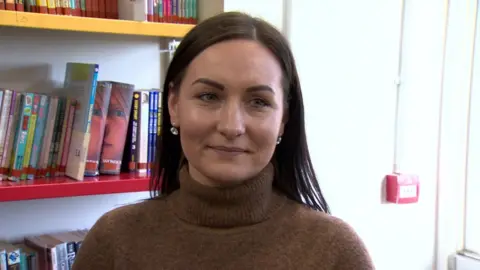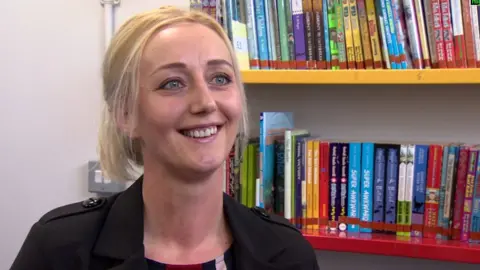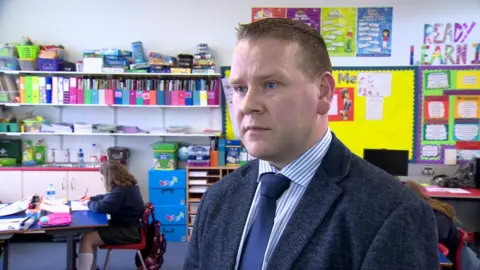EU parents: Northern Ireland 'feels like home'
 BBC
BBC"People were really nice and genuinely interested in me and where I was from and my life."
Renata Bytautiene, originally from Lithuania, is telling me why she has lived in Northern Ireland for 14 years.
Her two children have grown up in Dungannon, where she also works, and all of them want to stay here.
They are among thousands of people in Northern Ireland set to apply to a government scheme to allow them to do that.
Anyone currently living in the UK who is an EU citizen will have to apply to the EU Settlement Scheme in order to be allowed to stay in the country.
The scheme is due to open on 30 March 2019 and the deadline to apply is 30 June 2021, or 31 December 2020 if the UK leaves the EU without a deal.
Anyone who doesn't apply by the relevant deadline will no longer be living in the country legally.
Irish citizens, though, are exempt from having to apply.
Prime Minister Theresa May recently scrapped plans to charge applicants for the scheme.
'The most beautiful country'
BBC News NI went to Dungannon Primary School to meet Ms Bytautiene, Reda Mejeriene - also originally from Lithuania - and Agata Wylupek, who came to Northern Ireland from Poland.
It is one of the most diverse schools in Northern Ireland, as almost two-thirds of its 281 pupils are from families who originally came here from other countries.
All three women have been here for more than a decade and each have two children.
Ms Bytautiene said there were many reasons why she chose to stay in Northern Ireland and build a life.
"I think it's the most beautiful country," she said.
"The nature is amazing - the Giant's Causeway is breathtaking - and then people, as I said, they were quite genuine and quite caring."
To Ms Wylupek, Dungannon also feels like home for her family and that became apparent on a recent trip back to Poland.
"We stayed there for 17 days and after a week my girl said: 'I want to go back home. When are we going home?'.
"I left Poland when I was 12, so Poland for me is not really home and it probably never will be again."
'Feels like home'

Despite the fact they will apply through the settlement scheme to remain here, all feel some uncertainty about the future.
Mrs Mejeriene came to Northern Ireland 15 years ago and is adamant she and her family want to stay, but tells me that she has friends who have already returned to Lithuania.
"I would be sad to leave the country, as the kids were born here and their first language is English," she said.
"We like Northern Ireland and living here, and the kids feel at home here," she added.
But she and her husband have taken the step of planning for life elsewhere.
"Whenever Brexit came up we don't have anything in Lithuania just yet - no home or nothing - so we thought: 'Right, what if one day we will have to leave?'
"So we started to build a future in Lithuania, so we bought land and we're thinking to build a house just in case we will have to leave one day," she said.
'What rights will we have?'
Ms Wylupek, meanwhile, is hoping for some certainty soon about what exactly Brexit will involve.
"Watching TV, Polish news, English news and you still don't know anything new. It is scary and annoying," she said.
"I hope it will change and I hope in the future we will find out more about it, and that there's going to be a good deal for Brexit with the EU."
Ms Bytautiene also has questions.
"I don't think we're going to be shipped home.
"I think we'll be allowed to stay - but what rights are we going to have?
"Whether they make a deal with the EU or they don't, what happens after?" she asks.
According to the most recent labour market statistics, there are about 38,000 EU citizens working in Northern Ireland.
That figure does not include those from the Republic of Ireland.
'Rich cultural diversity'
Meanwhile, the most recent Office for National Statistics (ONS) figures estimate there are about 30,000 Polish people living here, and about 13,000 Lithuanians.
Dungannon Primary's principal, David Thompson, regards the number of pupils from other cultures in the school as one of its strengths.
"We think it provides a rich cultural diversity in terms of pupils having the opportunity to explore their own culture but celebrate the differences between the different cultures that exist within each of our classrooms," he said.

It is a controlled school, but now helps some pupils from a Catholic background to prepare for first communion and confession.
"As a school we feel it is important that we cater to the needs of each and every child," he said.
"Some children will belong to the Roman Catholic faith and therefore preparation is required and as a school we can ensure that preparation is provided.
"It's just natural integration taking place on a day to day basis."
